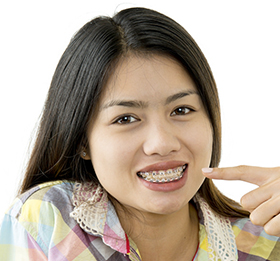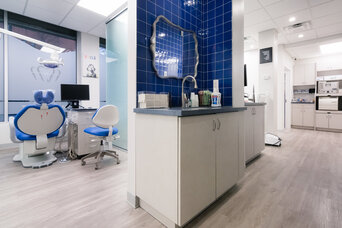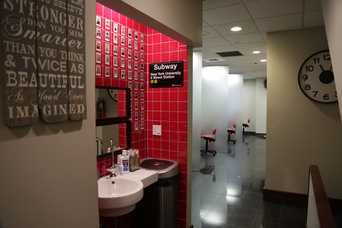EMERGENCY ORTHODONTIST BROOKLYN AND MANHATTAN NY
Urgent Orthodontic Solutions: Your Smile’s Lifesaver
When orthodontic emergencies occur, you can count on House of Orthodontia to be your trusted partner in providing the relief and assistance you need. We’re just a call away, ready to schedule an appointment to resolve the problem and get you back on track with your orthodontic journey. Our emergency orthodontist Brooklyn NY prioritizes your well-being and is committed to offering exceptional care during those unexpected moments.
Book Appointment BrooklynBook Appointment Manhattan
Why is Emergency Orthodontic Care Crucial?
Emergency orthodontic care is crucial because it ensures that any unexpected issues with your braces or orthodontic appliances are promptly addressed, minimizing discomfort and preventing potential complications.
Whether it’s oral bleeding, a swallowed device, or any other orthodontic emergency, quick action can make a significant difference in the success of your orthodontic treatment. At House of Orthodontia, we understand the importance of timely intervention, and our team is dedicated to helping you stay on the path to a healthy, beautiful smile.
Understanding Orthodontic Emergencies
Orthodontic emergencies can happen when you least expect them, and when they do, House of Orthodontia is your reliable partner, ready to provide the relief and assistance you need. To help you better understand orthodontic emergencies, here are some essential components to consider:
Types of Emergencies
It’s crucial to know what constitutes an orthodontic emergency. Common situations include oral bleeding, swallowing a device, loose brackets, broken wires, and more. Recognizing these situations is the first step in addressing them promptly.
Immediate Action
In the event of an orthodontic emergency, what should you do? Knowing the immediate steps to take can make a significant difference in your comfort and treatment outcomes. We’ll guide you on what actions to consider for different emergencies.
Preventative Measures
While we are here to provide emergency care, there are also preventive measures you can take to minimize the risk of orthodontic emergencies. We’ll share tips on how to protect your braces and appliances to reduce the likelihood of unexpected issues.
Timely Intervention
The importance of acting swiftly during an orthodontic emergency cannot be overstated. We’ll emphasize the significance of seeking prompt care to prevent potential complications and ensure the success of your orthodontic treatment.
Common Types of Orthodontic Emergencies
Orthodontics is a precise field that aims to enhance both function and aesthetics by straightening teeth. While braces are commonly used in this practice, orthodontic emergencies can still occur. Below are the six most common types of orthodontic emergencies:
Oral Bleeding: What to Do in an Orthodontic Emergency Oral Bleeding
Oral Bleeding
While rare, oral bleeding can occur due to issues with your braces or orthodontic appliances. It’s important to address this promptly to determine the cause and prevent further bleeding.
- What to do before the emergency appointment: Rinse your mouth gently with lukewarm water to clean the area. Avoid using any substances or medications without your provider’s advice.
 Swallowed Device
Swallowed Device
Accidentally swallowing a piece of your orthodontic appliance can happen, though infrequently. Knowing how to respond to this situation is crucial for your safety.
- What to do before the emergency appointment: Stay calm and do not panic. Do not attempt to retrieve the swallowed device yourself. Wait for guidance from your provider to ensure your safety.
 Loose bracket
Loose bracket
If your bracket or band is still attached to the wire, you should leave it in place and put wax on it if needed for comfort. If the bracket or band can be removed easily, place it in an envelope and save it to bring to your next appointment.
 Broken Wires
Broken Wires
The wires threaded through the brackets are vital for guiding your teeth into the correct position. However, these wires can snap, leading to discomfort and irritation. Knowing how to manage broken wires temporarily can make a significant difference in your comfort.
- What to do before the emergency appointment: Use tweezers to gently bend the broken wire back against the tooth. Apply relief wax to hold it in place temporarily. Avoid cutting or removing the wire, as it may worsen the situation.
 Mouth Sores
Mouth Sores
Changes in the structure of your mouth can lead to irritation and sores. While not always an emergency, knowing how to manage mouth sores can alleviate discomfort during your orthodontic treatment.
- What to do before the emergency appointment: Apply anesthetic gel as recommended to alleviate discomfort. Mention the presence of mouth sores during your next scheduled orthodontic appointment.
 Rubbing Irritations
Rubbing Irritations
Brackets on your teeth can sometimes rub against your lips, irritating. Learning how to use “relief” wax can help prevent and manage this common issue.
- What to do before the emergency appointment: Use “relief” wax to coat brackets that cause rubbing irritation. Avoid any attempts to adjust the braces yourself, as it may lead to further issues.
In all cases, contacting your emergency orthodontic provider promptly is paramount. Our team at House of Orthodontia will guide you through these immediate steps and schedule an appointment to address the issue professionally. Prioritize your safety and comfort, and trust your provider to manage your orthodontic emergency effectively.
Major Orthodontic Emergencies
While major orthodontic emergencies are exceptionally rare, they demand immediate attention when they occur, as they involve potential harm to the mouth, jaw, or teeth. Here are the key major orthodontic emergencies that necessitate a prompt visit to the emergency orthodontist:
- Infected or Swollen Gums: Severe gum infections or significant swelling within the mouth should not be ignored, as they can be indicators of serious underlying issues.
- Trauma or Injury: Any trauma or injury affecting the face, teeth, or mouth requires immediate evaluation by an orthodontic professional.
- Unmanageable Pain: If you’re experiencing unrelenting and severe pain in your mouth or face, it’s crucial to seek immediate care.
Should you encounter any of these major orthodontic emergencies, don’t hesitate to call us at (212) 392-4789 for our Manhattan office and at (718) 852-4414 for our Brooklyn office.
General Soreness and What You Can Do
When you get your braces on, you may feel general soreness in your mouth, and your teeth may be tender to biting pressures for three to five days. Below is a list of things you can do to manage this:
- Stick to a soft diet until your teeth do not hurt to chew.
- Rinse your mouth with a warm salt-water mouthwash to address irritated gums and other sore spots. Dissolve one teaspoonful of salt in eight ounces of warm water, and rinse your mouth vigorously.
- An alternative (better tasting) mouthwash is the Healthy Gums Rinse by The Natural Dentist. Placing Orabase on the affected area may also help relieve discomfort; Orabase can be found in a pharmacy.
- If the tenderness is severe, take Acetaminophen (Tylenol) or whatever you normally take for headaches or similar pain. Aspirin, Ibuprofen (Motrin, Advil), and Naproxen Sodium (Naprosyn, Anaprox) slow tooth movement, so it is not advisable to use them frequently while wearing braces.
The lips, cheeks, and tongue may become irritated for one to two weeks as they learn a new posture and become accustomed to the surface of the braces. You can put wax on the braces to lessen this. Upon your initial appointment for treatment, our team will show you how!
Non-Emergency Dental Issues and What to Do
While orthodontic emergencies require immediate attention, not all dental issues are considered emergencies. It’s essential to distinguish between urgent concerns and those that can be managed with routine care. Here, we’ll list some non-emergency dental issues and guide what you can do:
- Routine Adjustments: Scheduled orthodontic adjustments, like tightening braces, are a normal part of your treatment plan. Attend your scheduled appointments as advised by your orthodontist.
- Loose Bands or Spacers: If a band or spacer feels loose but doesn’t cause significant discomfort, contact your orthodontic provider to schedule a non-emergency appointment.
- Minor Discomfort or Irritation: Some level of discomfort, especially after adjustments, is common. Over-the-counter pain relievers (as recommended by your orthodontist) and warm salt-water rinses can help manage minor irritation. Mention any persistent discomfort during your regular appointments.
- Routine Maintenance: Continue to follow your orthodontist’s instructions for routine maintenance, such as cleaning your braces and appliances as directed.
- Broken or Lost Elastic Bands: If an elastic band breaks or falls off, contact your orthodontic provider during regular hours to discuss the issue and receive guidance on replacing the band.
- Non-Critical Wire Adjustments: If you notice a minor wire adjustment that doesn’t cause significant discomfort, contact your orthodontist during regular hours to schedule a non-emergency visit.
- Aligner Issues: If you encounter minor issues with your clear aligners, such as discomfort or difficulty wearing them, contact your orthodontic provider for guidance.
In situations where dental issues are not emergencies, it’s important to maintain open communication with your orthodontic provider. Our team can provide guidance, schedule non-emergency appointments, and address any concerns you may have as part of your ongoing orthodontic care.
Preventative Measures for Orthodontic Emergencies
Preventing orthodontic emergencies is a key part of ensuring a smooth and successful orthodontic journey. There are several preventative measures you can take to minimize the risk of unexpected issues:
Maintain Excellent Oral Hygiene
Good oral hygiene is crucial for preventing complications such as gum disease and cavities during orthodontic treatment.
- Follow your orthodontist’s instructions for brushing, flossing, and rinsing your mouth. Regular dental check-ups are also essential.
Be Mindful of Your Diet
Certain foods can damage braces and orthodontic appliances.
- Avoid hard, sticky, or crunchy foods that can cause brackets to break or wires to bend. Opt for a diet that is gentle on your orthodontic appliances.
Use Orthodontic Wax as a Preventative Measure
Orthodontic wax (relief wax) can be used proactively to prevent irritation and sores.
- Apply wax to areas that may rub or irritate your mouth before discomfort occurs.
Wear a Mouthguard for Physical Activities
Protecting your teeth during sports or physical activities can prevent injuries and potential orthodontic emergencies.
- Invest in a custom-fit mouthguard or use a boil-and-bite mouthguard to protect your teeth and braces during activities.
Report Changes Promptly
Reporting any changes or issues with your braces or appliances promptly can prevent them from escalating into emergencies.
- If you notice anything unusual, such as a loose bracket or wire, contact us for guidance.
Attend Scheduled Appointments
Regular orthodontic appointments allow your provider to make necessary adjustments and catch potential issues early.
- Attend all scheduled appointments as advised by your orthodontist.
Don’t Let an Orthodontic Emergency Hold You Back!
For immediate care and expert guidance, consult House of Orthodontia today. Our emergency orthodontist in Brooklyn and Manhattan NY and team are here to help you with orthodontic emergencies, creating beautiful smiles that change lives. Book your appointment now!


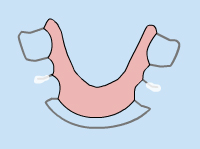 Oral Bleeding
Oral Bleeding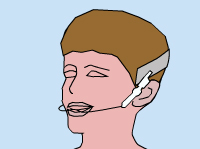 Swallowed Device
Swallowed Device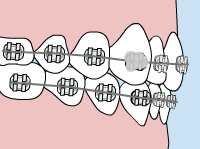 Loose bracket
Loose bracket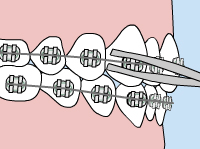 Broken Wires
Broken Wires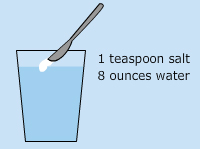 Mouth Sores
Mouth Sores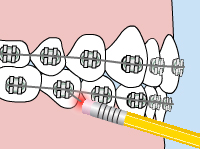 Rubbing Irritations
Rubbing Irritations